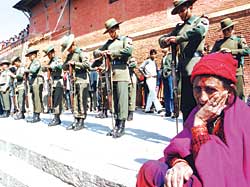 Just about everyone in remote Achham district was expecting a major Maoist attack the week of the sixth anniversary of the start of the "People's War". But no one expected it to be such a devastating defeat for the government, and such a rout of the security forces.
Just about everyone in remote Achham district was expecting a major Maoist attack the week of the sixth anniversary of the start of the "People's War". But no one expected it to be such a devastating defeat for the government, and such a rout of the security forces. Mangalsen residents are still in a state of shock, and what emerges on piecing together their accounts is a tragic tale of warnings not heeded, of unspeakable carnage and brutality during a long night of terror.
Five loud explosions at midnight on Saturday heralded the start of the attack. It shattered the silence of the sleeping bazar and reverberated across the surrounding hills. The sound of automatic gunfire rent the air, and bullets whizzed all around. There were frantic footsteps on the cobbled streets. It was pitch dark: the hydropower plant at Kailash Khola and the telecom tower had been knocked out. Half-an-hour later, there was a deafening blast in the bazar, more gunfire, more explosions, screams and slogan-shouting Maoists.
"We were awakened by the sound of the first explosions, and stayed awake all night," a local resident told us. "But no one dared to look outside until about 10 o' clock the next morning." Like many others we talked to, he did not want us to name him.
The police chief of the district was ordering his forces into position, and tried calling the barracks on the ridge overlooking the town for help. "No one answered the phone initially, then the line went dead," Yam Bahadur Chettri, Deputy Superintendent of Police told us. He said that one hour into the attack, the Maoists were attacking the town from all sides. Chettri survived because he fell into a trench while trying to escape after the Maoists blew up his office and set his residence on fire. Eye-witnesses said some 2,500 Maoists stormed the town, moving about in batches of 10-15 in a coordinated manner, and forcing cowering residents out of government buildings before blowing them up and setting them on fire.
The first explosions had come from the top of the spur on which the town sits, where the military barracks are located, a 10-minute walk uphill. It speaks for the ferocity of the attack that the battle lasted barely half-an-hour and only two out of a garrison of 59 soldiers survived. One army source told us: "It was a well-planned attack to completely wipe out the base with overwhelming force and firepower."
Twenty of the dead soldiers had execution-style bullet wounds in the head. Other bodies were severely charred. One injured soldier had his hand blown off when he picked up a Maoist grenade and tried to throw it back to them. He survived because the Maoists gave him up for dead. We were not allowed to speak to the other survivor, who was in a state of shock.
In a simultaneous attack, the Maoists also destroyed the airfield at Sanfebagar 20 km to the north, killing another 27policemen. With the barracks razed and nearly everyone killed, the Maoists had a run of the district headquarters. The policemen put up a brave defence, fighting almost to the last man, but they were overwhelmed by numbers and the Maoists' better weapons. The attackers used automatic rifles, mortars and rocket-propelled grenades captured during the Ghorahi raid on 23 November. The Maoists looted another 55 automatic weapons and five machine guns from the Mangalsen barracks.
The question on everyone's mind is why the base was not more prepared. Villagers around Mangalsen had noticed Maoist build-up two weeks before the attack, the rebels had distributed pamphlets, pasted posters and even organised rallies warning that they would attack the district headquarters soon. They even wrote threatening letters to the district administration, which were passed on to Kathmandu.
With all signs pointing to an impending attack, the Chief District Officer Mohan Singh Khatri (who was killed in the raid) is said to have lamented at an all-party meeting a few weeks ago: "It looks like Kathmandu will send reinforcements only for our funerals." As it turned out, the first army helicopters landed only at 10AM the next day. The chief of Accham's Intelligence Department had sent in a report which usually goes to the government, army headquarters and palace warning of the impending attack.
Nepali Congress MP for Achham Ram Bahadur Bista is livid, and says there was negligence at the highest level. He said: "I myself had informed the prime minister and home minister of the build up. And nothing was done until after it was all over on Sunday morning." This is what remains puzzling. Why, if so much information was available, was nothing done to safeguard Mangalsen and Sanfebagar?
(With additional reporting in Kathmandu.)


